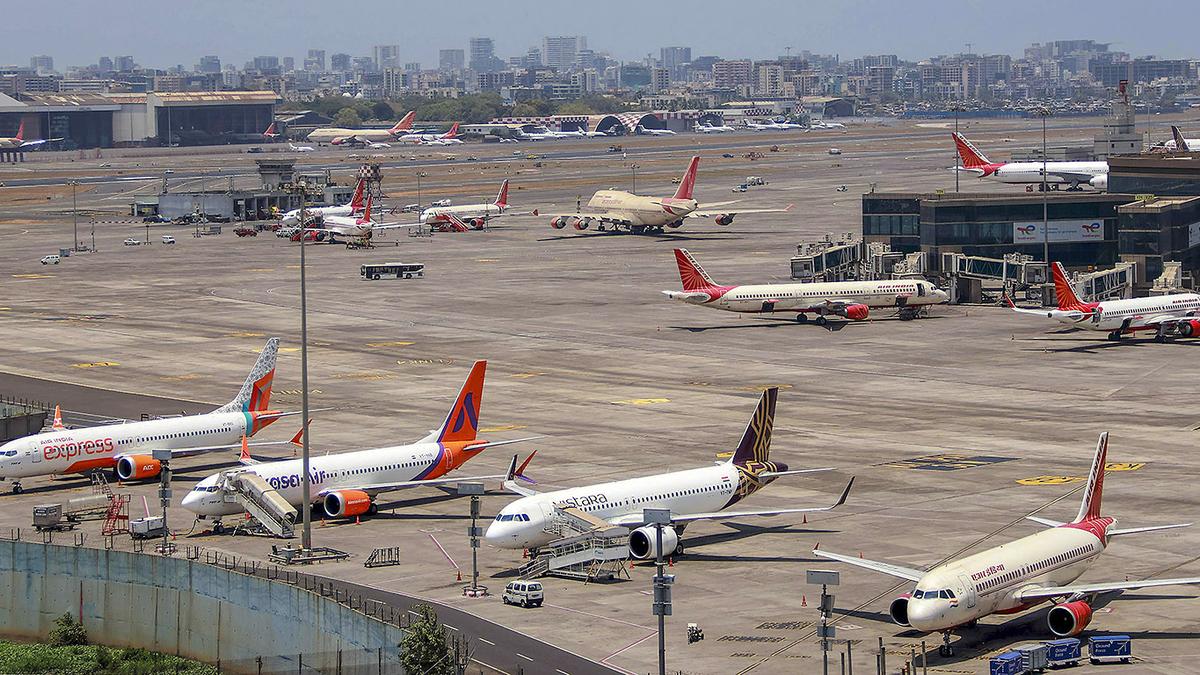
Flight cancellations affected 1.5 lakh people since December 2023: Data
The Hindu
Aviation industry in India faces crew shortage crisis, leading to mass flight cancellations and delays, impacting thousands of passengers.
Since December 2023, hundreds of cancellations and poor on-time performance of airlines have left thousands of people stranded at airports across India. Between March 31 and April 3 this year, 150 Vistara flights were cancelled and 200 flights were delayed by more than two hours. On May 8, Air India Express cancelled 90 of its 360 flights. Similar cancellations, though not at this scale, were recorded across many large airlines at various points this year.
The recent crisis to hit the aviation industry is fuelled by the unavailability of crew. In the case of Air India Express, about 200 cabin crew reported “sick”. In the case of Vistara too, crew unavailability was cited as the reason. There has been a mismatch between demand and supply of crew amid the expansion of the network.
The new troubles have come just as the aviation industry has started shrugging off the effects of the COVID-19 pandemic, which resulted in record losses for all airlines. During the first few months of the pandemic, in 2020, passenger flow came to a halt as airlines were grounded. In later months, passenger flow trickled in as airlines had to follow pandemic-related protocols. Despite that, airlines continued to pay salaries, airport fees, and aircraft and engine rentals and thus faced heavy losses. Later in 2022, when passenger flow returned to pre-COVID-19 levels, aviation fuel prices shot up. Airlines continued to suffer since passing on the fuel price to customers was not an option.
Chart 1 | The chart shows the cancellation rate of various airlines month-wise in the January 2022-March 2024 period. The bigger and darker the box, the higher the cancellation rate.
Chart appears incomplete? Click to remove AMP mode
In January 2024, 5% of IndiGo’s flights, 3.4% of SpiceJet’s flights, and about 2% of Air India’s flights were cancelled. Even in the month prior, cancellations ranged between 1% and 2% for these airlines.
Chart 2 | The chart shows the number of passengers affected by cancellations.

“Writing, in general, is a very solitary process,” says Yauvanika Chopra, Associate Director at The New India Foundation (NIF), which, earlier this year, announced the 12th edition of its NIF Book Fellowships for research and scholarship about Indian history after Independence. While authors, in general, are built for it, it can still get very lonely, says Chopra, pointing out that the fellowship’s community support is as valuable as the monetary benefits it offers. “There is a solid community of NIF fellows, trustees, language experts, jury members, all of whom are incredibly competent,” she says. “They really help make authors feel supported from manuscript to publication, so you never feel like you’re struggling through isolation.”

Several principals of government and private schools in Delhi on Tuesday said the Directorate of Education (DoE) circular from a day earlier, directing schools to conduct classes in ‘hybrid’ mode, had caused confusion regarding day-to-day operations as they did not know how many students would return to school from Wednesday and how would teachers instruct in two modes — online and in person — at once. The DoE circular on Monday had also stated that the option to “exercise online mode of education, wherever available, shall vest with the students and their guardians”. Several schoolteachers also expressed confusion regarding the DoE order. A government schoolteacher said he was unsure of how to cope with the resumption of physical classes, given that the order directing government offices to ensure that 50% of the employees work from home is still in place. On Monday, the Commission for Air Quality Management in the National Capital Region and Adjoining Areas (CAQM) had, on the orders of the Supreme Court, directed schools in Delhi-NCR to shift classes to the hybrid mode, following which the DoE had issued the circular. The court had urged the Centre’s pollution watchdog to consider restarting physical classes due to many students missing out on the mid-day meals and lacking the necessary means to attend classes online. The CAQM had, on November 20, asked schools in Delhi-NCR to shift to the online mode of teaching.









